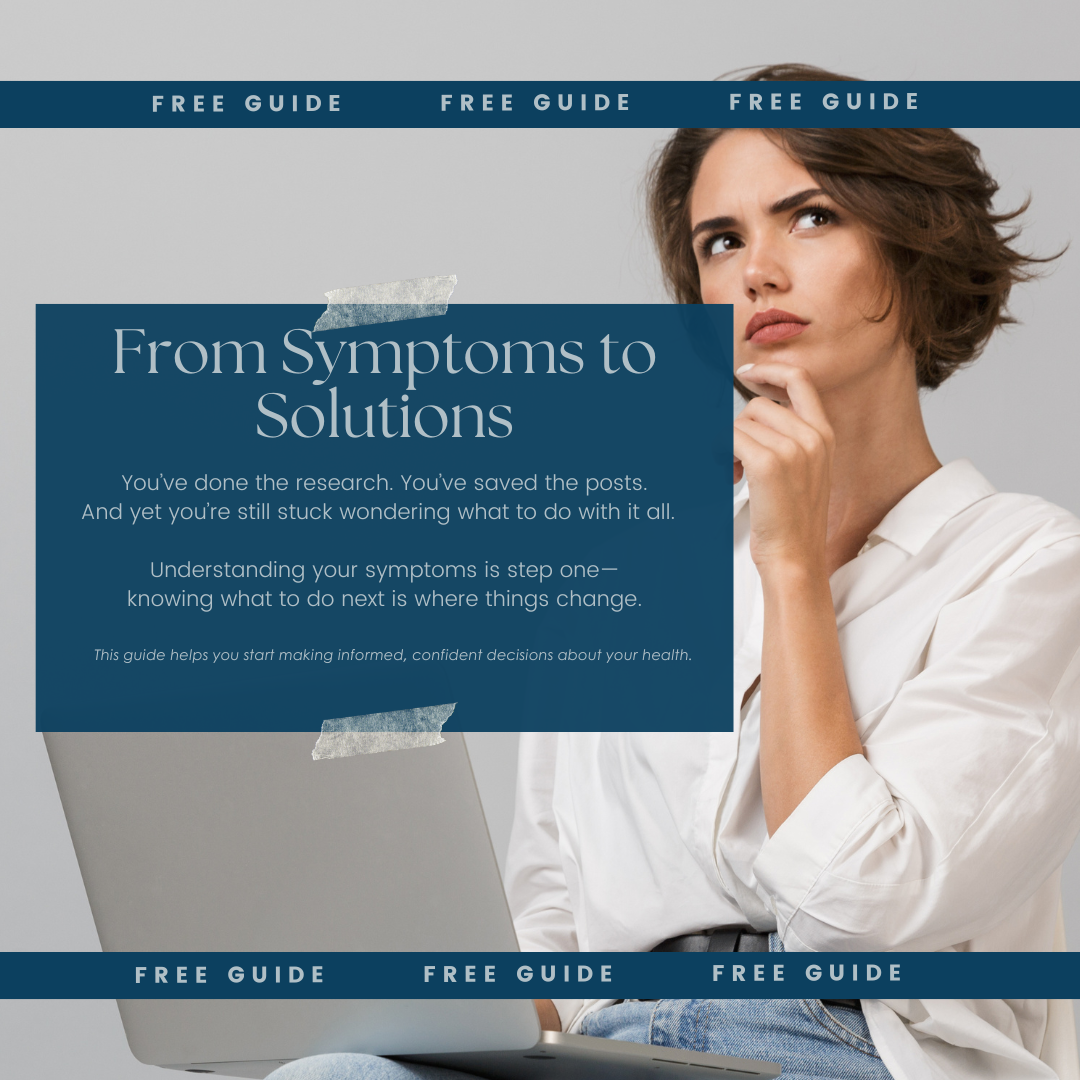Nutrition and Midlife Mental Health
Apr 25, 2023
Mental health is important in every stage of life, but there is no arguing the fact that midlife brings with it new challenges and stressors such as caregiving for aging parents and adjusting to an empty nest, career changes, divorce or relationship changes, existential or identity crises, and health issues or chronic illnesses.
Nutrition and mental health are clearly interconnected. For example, you may have experienced the impact that stress and other mental health challenges can have on appetite, food choices, cravings, and changes in weight.
There are ways to take back control and strategically use nutrition as one of many tools to improve mental health.
According to the Food & Mood Centre at Deakin University in Australia, “There have been many studies that have demonstrated that a good quality diet is important to the risk of or prevention of mental disorders.” This means that by eating a nutritious, balanced diet, you can lower your chances of experiencing mental health concerns in the future.
But, what if you’re already experiencing symptoms?
The good news is that recent clinical trials have found that improving food choices can help to reduce symptoms and improve moods.
Choosing the right foods, drinks, and supplements can make a big difference.
- Food and nutrient strategies for those Midlife Mood Swings!! There are a lot of nutrition strategies that can help to reduce stress and optimize moods in general, whether it’s for depressed moods, anxious moods, or rage (which is common during perimenopause).
- Eat A Variety Of Balanced, Healthful Foods Ensuring you get a variety of foods helps you meet your nutrition needs for optimal health (physical and mental) every day. This includes loading up on whole grains, fruits, vegetables, dairy, olive oil, and nuts every day; plus legumes, lean red meat, fish, poultry, and eggs a few times per week.
- Ensure You’re Eating Meals As A Matter of Routine Sometimes our moods and life in general disrupt our eating patterns. We may forget to eat meals in the first place, or double-up when we forget that we’ve already eaten a meal. Regularly eating nutritious meals can help balance moods. If it will help, consider setting yourself reminders or scheduling mealtimes to ensure that you nourish your body and mind on the regular. Perhaps a meal plan that has all of your meals laid out for you is what you need. [Click here for some amazing Recipe Bundles]
- Enjoy Your Meals Mindfully Eating mindfully is when you pay attention to your food when you eat. This means making thoughtful food choices, eating slowly, chewing well, and savoring the flavors and textures. Not only does mindful eating help keep you focused on enjoying the food in front of you in the present moment, but it helps improve digestion and can positively influence mental health.
- Consider Probiotics Several recent studies have found that probiotic supplements may help with depression and anxiety. Probiotics are friendly, live microbes that can improve gut health and are often found as dietary supplements. Probiotics help influence moods is because of the gut-brain connection. The gut and brain communicate with each other through the nervous system, as well as via molecules called neurotransmitters. This is the same connection that can cause stomach upset during stressful times, and why some gut conditions can trigger depression or anxiety. It’s an emerging area of research now that is shedding light on how we can leverage gut health for better mental health.
- Curb Intake Of Refined Sugars There’s a link between depression and consuming a lot of refined sugar (like the kind found in sweets, desserts, sodas). One of the reasons is that the brain depends on a steady supply of blood sugar (glucose). When we eat or drink refined sugars, they’re absorbed very quickly and spike blood sugar levels like a rollercoaster. This effect can then impact the brain and influence moods. Many people find that when they’re feeling down, they crave sweets to help boost their moods. So while sweets may seem to feel good temporarily, over the long term they can lead to worsening mood swings. A nutrition strategy that can help reduce intake of refined sugars is to have healthier foods available—especially when it comes to snacks and desserts. Instead of reaching for sweets and sugary drinks, consider fruits, nuts, and unsweetened beverages like fruit-infused water and teas.
- Enjoy Coffee In Moderation Coffee contains antioxidants that can help reduce the harmful effects of oxidative stress and inflammation. Coffee also contains caffeine. Low-to-moderate amounts of caffeine can help to increase energy, alertness, and concentration which are often a much appreciated boost for those who need it.
- Don’t Overdo the Caffeine While some coffee may help with symptoms of depression, too much caffeine can increase symptoms of anxiety—especially in those who are more sensitive to it. Some of the side effects of having too much caffeine are jitteriness, increased heart rate, sleep difficulties, and anxiety. Moderating your overall caffeine intake (from all sources including coffee, tea, soda, energy drinks, caffeine supplements, some medications, etc.) can help.
Other lifestyle habits and self-care strategies that can help with depression and anxiety:
- Physical Activity Exercise can lower symptoms of depression and anxiety—especially when done regularly (e.g., during most days). Physical activity helps us to reduce stress hormones, lower our blood pressure, and release “feel good” compounds called endorphins. Just 30 minutes of walking per day can help improve your mood. You can even break it down into three 10-minute sessions during the day.
- Prioritize Sleep Getting enough quality sleep is great for your body and mind. Sleeping 7-9 hours/night can help you get into deep REM (rapid eye movement) sleep which allows the body to repair tissues and supports a healthy immune system.
- Stress Management Other activities that can help to manage some of the stressors that lead up to or worsen depression and anxiety include mindfulness, meditation, relaxation exercises, deep breathing, and taking time each day to pay attention to the positive. These activities can help to reduce muscle tension, lower the heart rate, and calm the mind.
- Stay Connected Being social with people whom you care about and who care about you is an often forgotten step toward optimal mental health. Reaching out and keeping in touch with friends and family regularly—especially when you need support—can make a world of difference. You can also meet new people by joining a group or volunteering to support an issue that means a lot to you.
Nutrition can play a big role in reducing the risk of getting depression and anxiety in the first place, and to help manage the symptoms once they occur. The vitamins, minerals, proteins, carbohydrates, and fats we eat are used to help fuel and function our physical and mental health. This means that our food choices can help to optimize more balanced moods.
For your mental health, enjoy a nutrient-rich variety of foods that include fruits, vegetables, whole grains, nuts, seeds, and proteins. Cutting back on foods that have refined sugars, and finding your personal optimal amount of coffee to enjoy every day can help.
There is growing evidence that certain foods, supplements, and lifestyle habits can influence the risk and symptoms of depression and anxiety. They may play an important role if symptoms are mild, and can also help to support other treatments. Please see your healthcare professional or book an appointment with me to discuss your personal needs and goals when it comes to nutrition for mental health.
Stay connected with news and updates!
Join our mailing list to receive the latest news and updates from our team.
Don't worry, your information will not be shared.
We hate SPAM. We will never sell your information, for any reason.


